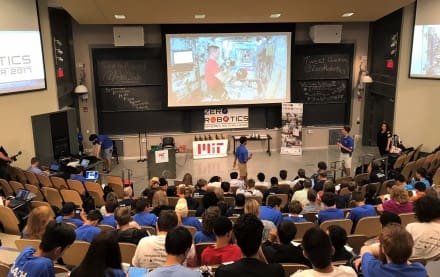through computer programming and space research
Cambridge, MA, August 11, 2017 – Middle school students across the country today participated in a live interactive broadcast of NASA astronaut Jack Fischer operating satellites developed by Aurora and MIT aboard the International Space Station (ISS). The basketball-sized, battery operated satellites were controlled using computer code written by the students as part of the Zero Robotics summer learning program.
Founded by MIT’s Space Systems Laboratory and run in partnership with Aurora and the Innovation Learning Center, Zero Robotics is a robotic programming competition for middle and high school students. Students learn to write software to autonomously control the SPHERES satellites aboard the ISS. Each year, the Zero Robotics competition challenges students to address a real spaceflight operational scenario.
“Aurora is proud to partner with MIT on this innovative and engaging STEM-education program,” said John Langford, Aurora Chairman and CEO. “Zero Robotics has introduced thousands of students over the years to the wonders of spaceflight and robotics. With this next generation of scientists and engineers at the helm, the future of NASA’s space program looks exceptionally bright.”
Aurora built the SPHERES satellites and has partnered with MIT on the Zero Robotics program since its inception in 2008. Over the years, Aurora’s involvement has evolved to encompass competition coordination support, student mentoring, instructor education, and curriculum development.
This year’s middle school finals comprised of 13 teams hailing from 12 U.S. states and Russia. Zero Robotics is also open to high school students, with a tournament held each year between September to December for students grades 9-12. The Middle school competition is sponsored by the Center for the Advancement of Science in Space (CASIS), the Northrop Grumman Foundation, and NASA. To learn more about the Zero Robotics program, and to view results from today’s competition, visit www.zerorobotics.mit.edu. To learn more about Aurora’s SPHERES program, visit www.aurora.aero/SPHERES.
Tags: Aurora Flight Sciences, MIT


